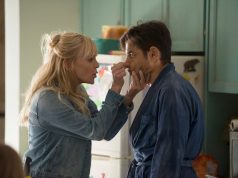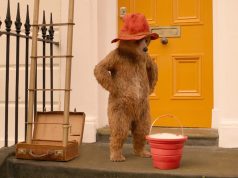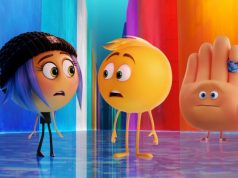Whenever they announce something like a Marmaduke movie, or a Smurfs movie, or a — sure, why not? — Yogi Bear movie, people’s reaction is always the same: “Who wanted THAT?!” Well, I hate to break it to you, but we’ve reached the point where it doesn’t matter if literally not one person on Earth wants to see a big-screen version of a fictional character. If someone in Hollywood owns the rights to that character, a movie will be made. That’s just how it is.
So here, inevitably, is “Yogi Bear,” which puts a computer-animated Yogi and Boo Boo in a live-action Jellystone Park and gives them the voices of Dan Aykroyd and Justin Timberlake. Turns out Aykroyd and Timberlake do really good impressions of these 50-year-old cartoon characters, which means there is one (and precisely one) aspect of the film worthy of praise.
As you are probably aware, Yogi is a binge-eating kleptomaniac with a particular fetish for picnic baskets. He rarely speaks of their edible contents — he seems to be more interested in the baskets themselves, regardless of what specific foodstuffs may be found therein. He is enabled by Boo Boo, an adult bear who is much smaller than Yogi, possibly due to a chromosomal condition such as dwarfism. Yogi and Boo Boo both wear neckties, but only Yogi wears a hat, because he is in charge.
12/15/2010: A Scientific Breakdown of the Physical Comedy Presented in the ‘Yogi Bear’ Trailer
Both bears are also capable of human speech — English, specifically, though it is conceivable that they could learn other languages, as their ability to read is also implied — and this fact is noted by the humans around them. It isn’t like in some movies, where the animals talk to each other but people only hear regular animal noises, or where they only talk when humans aren’t around, or where only certain humans can understand them. Yogi and Boo Boo converse openly with one and all. But Ranger Smith (Tom Cavanagh) and Ranger Jones (T.J. Miller), the only two employees at the enormous Jellystone Park, find Yogi’s habit of stealing visitors’ food far more noteworthy than his ability to speak. A nature photographer named Rachel (Anna Faris), who wants to make a documentary about Jellystone, is eager to meet the talking bears for novelty’s sake, but soon becomes blasé about it. Her interest in the park is related to the grandeur of its natural beauty, not the fact that talking bears live in it. Likewise, the local mayor (Andrew Daly) and his chief of staff (Nathan Corddry) acknowledge that Yogi and Boo Boo speak, yet find the fact unremarkable.
I mention all this because of the film’s plot, which is as follows. The unnamed town of which Jellystone Park is a part is going bankrupt, and the evil mayor plans to sell Jellystone to land developers. (You might think Jellystone is a national park, or at least a state park, given that it is thousands of acres in size and has rivers, waterfalls, and mountains. But no, it is entirely within the jurisdiction of one small town.) Ranger Smith, who loves Jellystone more than life itself, has only one week to come up with $30,000 to meet the park’s operating budget.
To recap, the plot of “Yogi Bear” is that Ranger Smith must raise $30,000 to save Jellystone Park. The park where talking bears live.
“Pardon me, Mr. Ranger, sir, I was wondering–”
“Don’t talk to me now, Yogi! I’m trying to think of ways to attract visitors to Jellystone!”
“What if I did my waterskiing act?”
“Be quiet, Yogi! How am I supposed to come up with fundraising ideas when I’m constantly being interrupted by a talking bear??”
“What if we held a bake sale?”
“Please, Yogi! Stop formulating thoughts in your highly evolved brain and using your miraculous vocal cords to express them in speech! I’m trying to think of a way for the park to raise money!”
Ranger Smith’s solution is to throw a party for the park’s 100th birthday, which happens to be next week, and which Ranger Smith didn’t realize was coming up, which may explain why he is so terrible at keeping the place running. Within 24 hours, he has spread the word and gathered thousands of people to come celebrate at Jellystone. Yogi does his waterskiing routine, which observers find entertaining but not especially noteworthy, and then Yogi accidentally sets off all the fireworks, which terrifies people into fleeing for their lives. And thus the bear that can talk and waterski has somehow COST the park money, a cruel irony.
Spoiler alert: The way the park is finally saved is that they realize the turtle that Boo Boo keeps as a pet is an endangered species, and so Jellystone must be federally protected. You know what else is an endangered species? Bears that can talk.
I’m dwelling on this aspect of the movie because all of its other aspects aren’t any fun to talk about. Three writers are credited. Among them, they came up with dialogue such as this, with regard to Boo Boo’s flatulence: “For a little bear, he sure makes a big stink!”
They also conceived this moment, when Yogi tells Ranger Smith how to woo Rachel: “Urinate on her to mark her as your territory.”
There is also the part where Rachel used tree bark as a postcard, and for ink used “bird poop and spit.”
I may have neglected to mention that there is a scene where Yogi and Boo Boo dance to “Baby Got Back.” Yes, reviewing what I have written so far, I find that I have indeed neglected to mention that. Please consider this a rectification of that oversight.
Late in the film, Ranger Smith and Rachel’s budding romance has apparently suffered a setback. He has “lost the girl” and must reconcile. I use the word “apparently” because the scene in which this break-up takes place is NOT IN THE MOVIE. One minute things are fine, the next minute Ranger Smith is sad because Rachel has left him. Bears dancing to “Baby Got Back,” sure, we have time for that. But a scene that actually relates to the story, sorry, no, cutting-room floor.
The director, Eric Brevig (“Journey to the Center of the Earth”), probably did everything he could with the simple-minded screenplay, the dumb jokes, and the general tedium. Studio heads probably instructed him to overdo the 3D gimmicks, too. Who knows, maybe they even told him to prevent Anna Faris from being funny, which I wouldn’t have thought was possible. In a way, though, the film is faithful to the old cartoons, in that it’s grating and tiresome and not suitable for anyone over the age of 4. The animation is better, though.
D (1 hr., 20 min.; )





